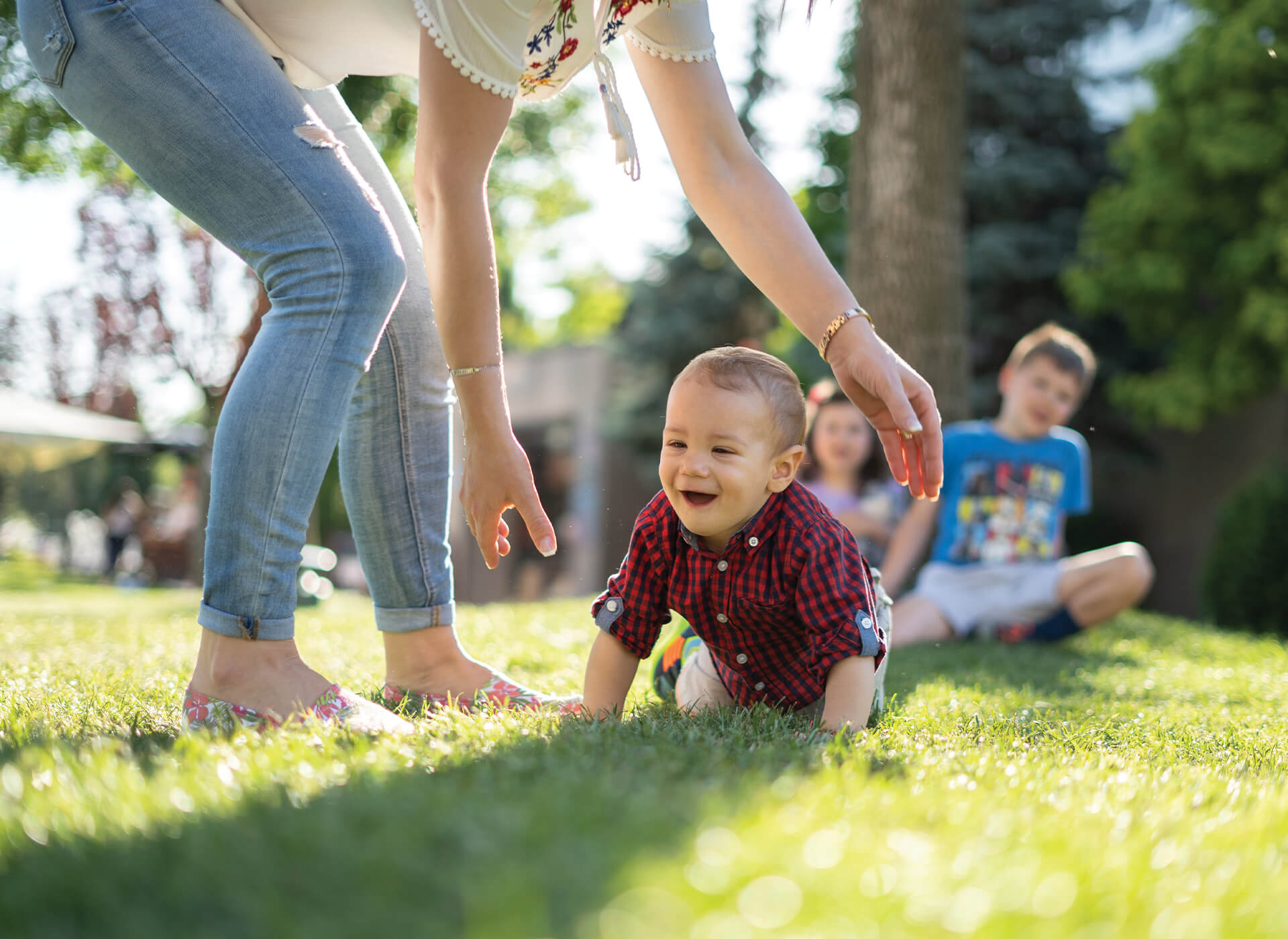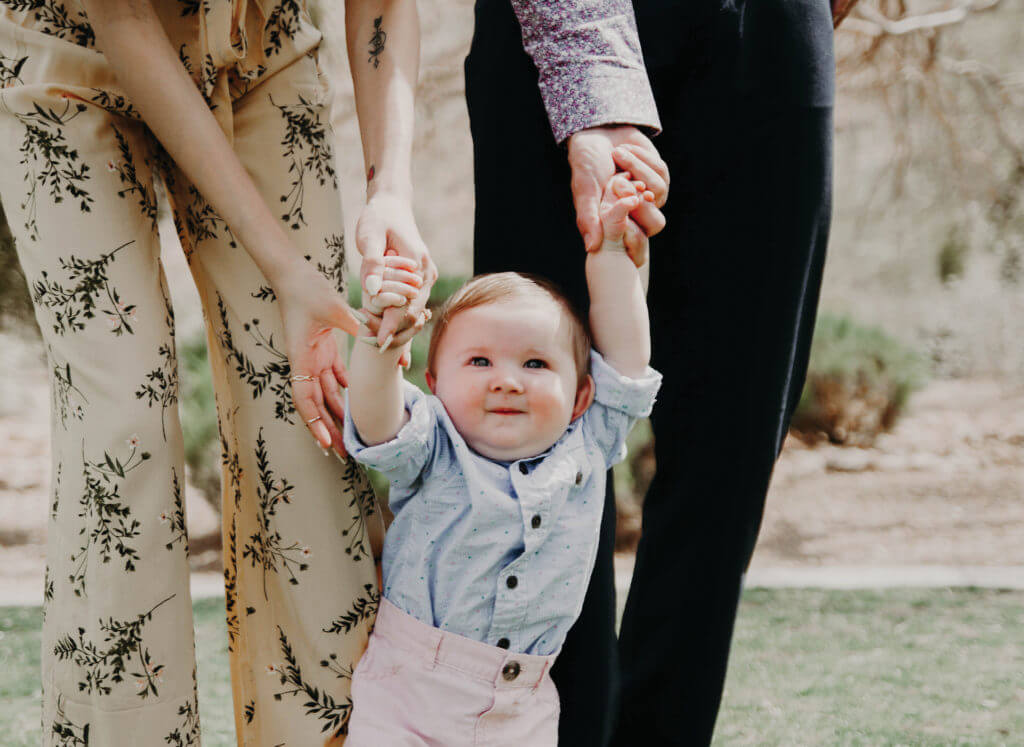
The experts weigh in on the stages a toddler should be walking and talking.
“Don’t be concerned about reaching milestones at specific timeframes as no two children develop exactly the same way and within the exact same time frame.” – Amanda Reilly
My daughter was almost 20 months old before she started walking. Having thrilled us with a few unprompted steps toward the television at 16 months, she stubbornly scaled the walls, couch and kitchen table legs as I increasingly pestered Google with: ‘What if my child isn’t walking at 17… 18… 19 months?’
While I was busy developing a mild case of anxiety, I knew it was likely my child was developing just fine, statistically speaking. But in a hypervigilant, hypercompetitive parenting culture, it’s hard not to cast a comparative eye across the playground.
Sarah Hallams, a physiotherapist at Therapies for Kids, and Amanda Reilly, a speech pathologist at Kids First Speech Pathology, have seen many a slow bloomer… well, bloom. They talk us through the development milestones and asked when parents should try to relax and when they should take action.
Milestones at 6-12 months
Sarah: “I’m always reassured when a bub has been making steady improvements and gaining skills, even if they are a little behind their friends at mothers’ group. Big things to look out for at this age include any signs of asymmetry – in other words babies who are only looking to one side or using one arm or leg much more than the other – babies that feel ‘stiff’ or ‘floppy’, or babies who have trouble controlling the position of their head and neck.
“Babies at the six-month mark likely to reach and grab anything they can get those beautifully chubby hands on (my glasses are a fan favourite). If your baby isn’t bringing both hands to their mouth or isn’t showing much interest in grabbing toys and your hair, then it’s worth coming to say hi to your local paediatric physiotherapist.”
Amanda: “I generally tell parents that your baby should be babbling or producing some consonants and vowel sounds between six and nine months of age. If after nine months your child isn’t babbling or is making limited sounds, look at their overall communication skills. Do they become startled at loud noises? Do they respond to voice and sound? Do they turn their head toward a sound source? Do they watch your face when you speak to them? Do they stop crying when you speak to them? Do they smile and laugh yet? Do they use eye contact?
“Parents often focus on their child’s verbal output as their sole source of communication. However, communication is so much more than words. If you are concerned about any of the preverbal communication, I suggest airing your concerns with your doctor or paediatrician.”
Milestones at 12-18 months
Sarah: “By their first birthday, babies should be on the move! By now you’ll likely have a very active crawler on your hands who is getting into anything within reach and pulling up to stand to explore their environment. Not all babies will have found their walking feet by the time they hit one, but they should be at least taking weight through their legs to stand up and play. It’s a good idea to take action if your baby is showing no interest in standing and taking weight through their feet or if they are ‘stuck’ in sitting. If your little one is cruising around furniture to explore their environment and is continuing to gain confidence on their feet, then you can relax and enjoy these final couple of months before you are chasing them everywhere!”
Amanda: “Between 12-18 months, children’s ability to learn and use language increases dramatically. Most one-year-olds will have between two and six words. By 15 months, their vocabulary has increased to approximately 10-15 words and by 18 months their vocabulary hits roughly 50 words. It’s best to think of milestones as ranges; plus or minus a month or so. Don’t be concerned about reaching milestones at specific timeframes as no two children develop exactly the same way and within the exact same time frame.”
Milestones at 18-24 months
Sarah: “I see so much variety in skills at the 18-month mark. Some kids are halfway up the climbing wall whereas others are only just taking their first wobbly steps. If your little one is still not walking at 18 months, it’s worth seeing a physiotherapist. Often these kiddos just need a little extra support to gain the strength and confidence they need to take off.”
Amanda: “If your child isn’t using any words spontaneously by 18 months old, it’s best to investigate further. Try not to rely on verbal output as the only measure of language development. Look at their preverbal communication – can they share? Can they maintain attention to a game? Can they follow simple instructions? Can they imitate spontaneously? Can they engage in imaginative play? Do they use gesture to communicate? Do they attempt to copy new words? Do they respond to requests?
“At 24 months, children are like sponges, absorbing (and repeating) everything. Typically developing children will have, at minimum, an ability to combine two words together in an utterance (for example, ‘Mummy up’, ‘more milk’, ‘Daddy sit’) and should be consistently using longer utterances to communicate as they get older.”

How can parents support their kids in reaching their developmental milestones?
Sarah: “Let your kids move! In our busy lives we spend much more time with our babies contained in car seats, capsules and bouncers. Children learn how to use their bodies and develop their strength through experiencing a wide variety of movements and practising these regularly. Letting your child explore their environment, take reasonable risks, fail and try again helps to build strong little bodies and minds.”
Amanda: “Talking and playing with them. Communication is a two-way interaction. Children learn from modelling from us, copying, engaging and exploring. It’s also extremely important to incorporate books and reading into your child’s life. Don’t get stuck on reading the words on the page. Let your child explore. Follow their lead. Let them turn the pages. Make up your own story or your own sounds. Ask them questions. Talk about feelings and predictions about what happens next. There is no wrong way.”
It’s important to remember that, as Amanda pointed out, no two tots will manage a milestone at the same rate or within the same timeframe. Reach out if you’re concerned, but ultimately it helps to be patient, pragmatic, and embrace the little wins along the way. Now 22 months old, my daughter struts about like she invented the step. She’s not quite running, but unlike my former, frantically-Googling self, I’m savouring her slow and steady pace in the milestone race. Hey, it worked out just fine for the tortoise.
Note: The content is not intended to be a substitute for professional medical advice, diagnosis, or treatment. Always seek the advice of your physician or other qualified health provider with any questions you may have regarding your child’s development.























